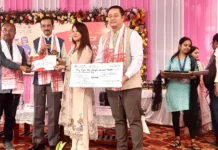TAWANG, 29 Jun: The office of the assistant director of economics & statistics here celebrated the National Statistics Day with great fervour on Saturday.
Tawang ADC Sang Khandu, who attended the event as a guest, highlighted the significant contributions of Prof PC Mahalanobis – an eminent Indian scientist and statistician – noting his development of the Mahalanobis distance and his role as a member of India’s first planning commission.
Stressing the importance of accurate statistical data, he emphasised its crucial role in achieving developmental goals.
Assistant Director of Economics & Statistics (i/c) Tenzin Phuntso explained the significance of the National Statistics Day, which is commemorated annually on 29 June in honour of Prof Mahalanobis, and outlined plans to “expand future celebrations of this day in the district.”
Senior statistical investigator Nawang Dorjee announced the names of the winners of an essay writing competition which had been conducted among students, and the ADC honoured them with cash prizes and certificates.
The event also included felicitation of teachers and guests, with statistical investigator TP Yati underscoring the importance of “reliable statistical data in decision-making processes.”
The event concluded with a commitment from the officials to ensure error-free publication of the annual statistical data information book, which provides comprehensive insights into Tawang district.
The Arunachal Pradesh Economics & Statistics Personnel’s Welfare Association (APESPWA) also celebrated the National Statistics Day in various districts across the state on Saturday.
“The day honours Prof Mahalanobis’ significant contributions to the fields of statistics and economic planning. He played a crucial role in the planning process of independent India by formulating the second Five-Year Plan,” the association stated in a release.
The day was observed also by the APESPWA members in Itanagar, where APESPWA president Marli Ingo said, “Statistics or statistical science and application infuses life in planning processes and executions, on ground, of all economic developments, and all other policies and programmesof the welfare government.” (With DIPRO input)

